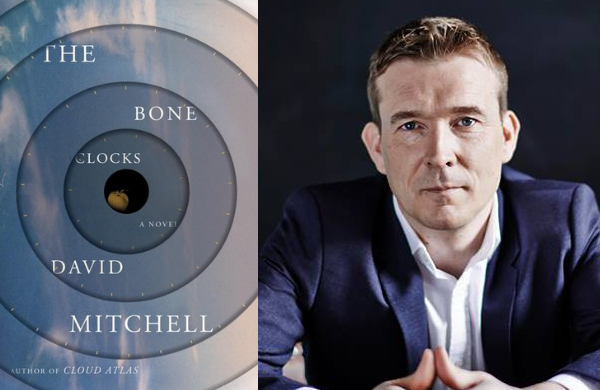Eight Books for Fans of David Mitchell
(image via David Mitchell on Facebook)
David Mitchell’s Cloud Atlas completely floored me: the step-pyramid narrative structure, the inventiveness of each of the interwoven worlds, the neologisms and peculiarly delightful turns of phrase are all nothing short of fantastic, in every sense of the world. And while I’m as jazzed as anyone to crack open his latest novel The Bone Clocks, I’m also already dreading the day when it’s over. Feel the same way? Here are eight picks for us Mitchell fans to read next.

“Our Town,” Thornton Wilder: In an interview with the Paris Review, Mitchell called this play “one of the first works of literature that moved me. It implanted a distrust of the distinction between high-, middle-, and lowbrow books.” This everyday tragedy of small-town life is profound and metafictional—much like Mitchell's own work.

If On A Winter’s Night A Traveler, Italo Calvino: Mitchell has said that he was “magnetised” by Calvino’s twisting postmodern novel as an undergraduate, and told the Paris review that reading it was a source of inspiration for Cloud Atlas: “Finishing the novel, I felt a bit cheated that Calvino hadn’t followed through with what he’d begun—which was, of course, the whole point of the book.
But a voice said this: What would it actually look like if a mirror were placed at the end of the book, and you continued into a second half that took you back to the beginning?”

Pale Fire, Vladimir Nabokov: Mitchell is an admirer of Nabokov’s work, almost to the point of envy—a passage in his novel Ghostwritten advises writers trying to finish a book not to read Nabokov, because they’ll feel hopelessly undertalented.
Pale Fire, whose metafictional narrative unfolds in the scholarly notes to a long poem, has many elements for Mitchell fans to dig into: a narrator who becomes increasingly more unreliable, an intricate mythology of a fictional—or is it?—foreign land, a plot filled with a slow-building dread, and crystalline language.

Magic for Beginners, Kelly Link: Like Mitchell’s work, Link’s writing defies easy description: it’s kind of fantasy, kind of sci-fi, kind of literary, and immediately immersive. The short stories in this collection, Link’s second, blend genres happily and often.
Try “The Library” for a delightfully metafictional tale of teenagers obsessed with a cult TV show, or “Lull” for a Mitchell-like stack of stories-within-stories about Devils, Cheerleaders, a sex-line worker named Starlight, and weird green alien beer.

“Sleep Donation,” Karen Russell: This digital-only novella by Pulitzer finalist Russell is decidedly straightforward in its creepiness: a lethal insomnia has swept America and the only solution is, well, sleep donation, which allows healthy sleepers to pump their REM into those wealthy enough to afford it. Good for fans of the eerie-but-everyday elements of Mitchell’s work.

House of Leaves, Mark Z. Danielewski: This intricate, spellbinding novel busts out almost every metafictional trick in the box—footnotes, marginalia, monographs, allusions to documentaries that don’t exist—to spin a story that’s part horror story, part romance.
With inventive layout (the word “house,” for example, is always printed in blue), it’s a book of many (literal) layers that well deserves its cult status as a cracking—if disorienting—read. Pro-tip: don’t read it at night.

"Arcadia," Tom Stoppard: Stoppard’s 1993 play leaps nimbly between the nineteenth century and the present, alternating between two casts of characters in the same English country house. In 1803, brilliant young Thomasina Coverly, daughter of Lord and Lady Croom of Sidley Park, and her tutor, one Septimus Hodge, discuss determinism and Fermat’s Last Theorem and slowly, eventually fall in love.
Two hundred years later, scholar Hannah Jarvis attempts to uncover the true identity of the mysterious hermit of Sidley Park with the help of the son of the modern Lady Croom. The dialogue is witty, the philosophical conceits probing, and the unfolding connection between the intertwining storylines perfectly paced.

Night Film, Marisha Pessl: In her second novel, Pessl—widely acclaimed for her debut, Special Topics in Calamity Physics—delves into the world of reclusive filmmaker Stanislas Cordova, a Kubrick-like figure whose later life was shrouded in mystery. When Cordova’s daughter, Ashley, is found dead in a New York elevator shaft, journalist Scott McGrath has to investigate—even though reporting on Cordova is what lost him his job.
News clips, medical documents, photographs, and even a dedicated app build a whole world around the enigmatic Cordova, and the mystery of his daughter’s death is page-turningly addictive.

Blair Thornburgh
BLAIR THORNBURGH is a graduate of the University of Chicago, where she earned a B.A. in medieval studies and delivered a pretty good commencement speech. She lives in Philadelphia.




